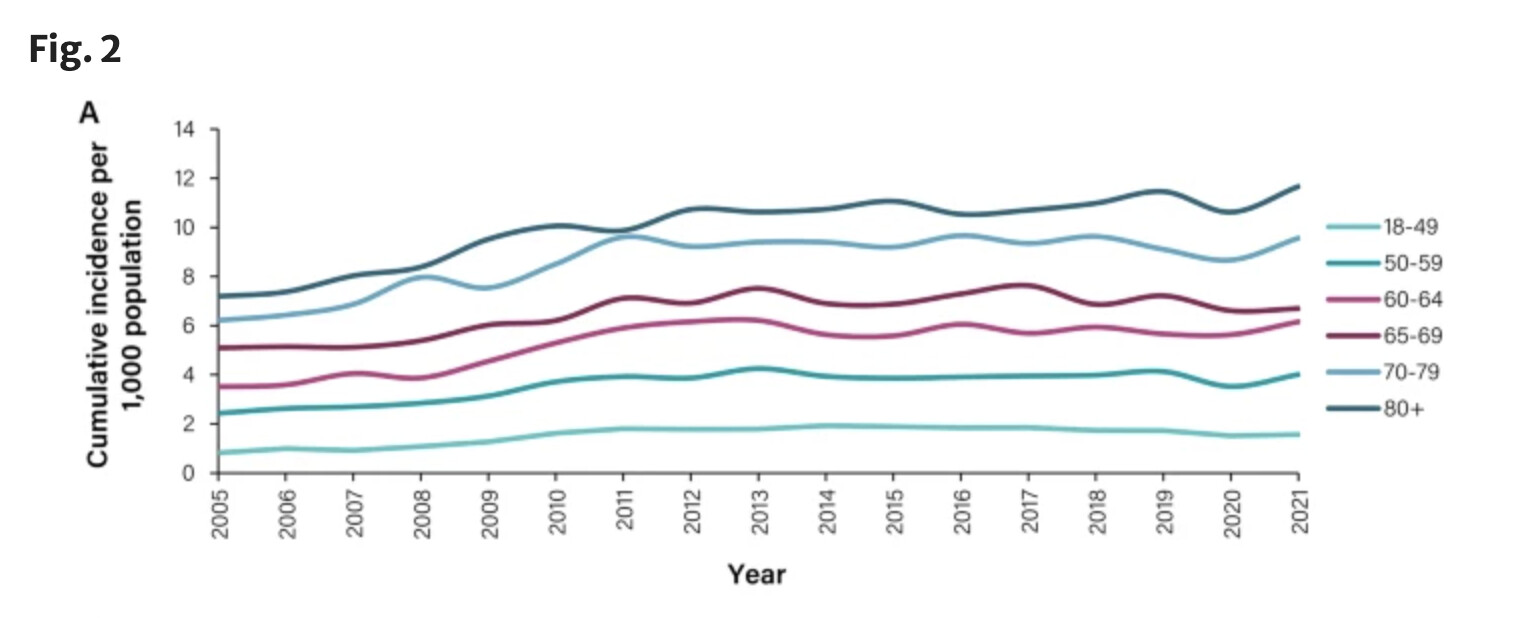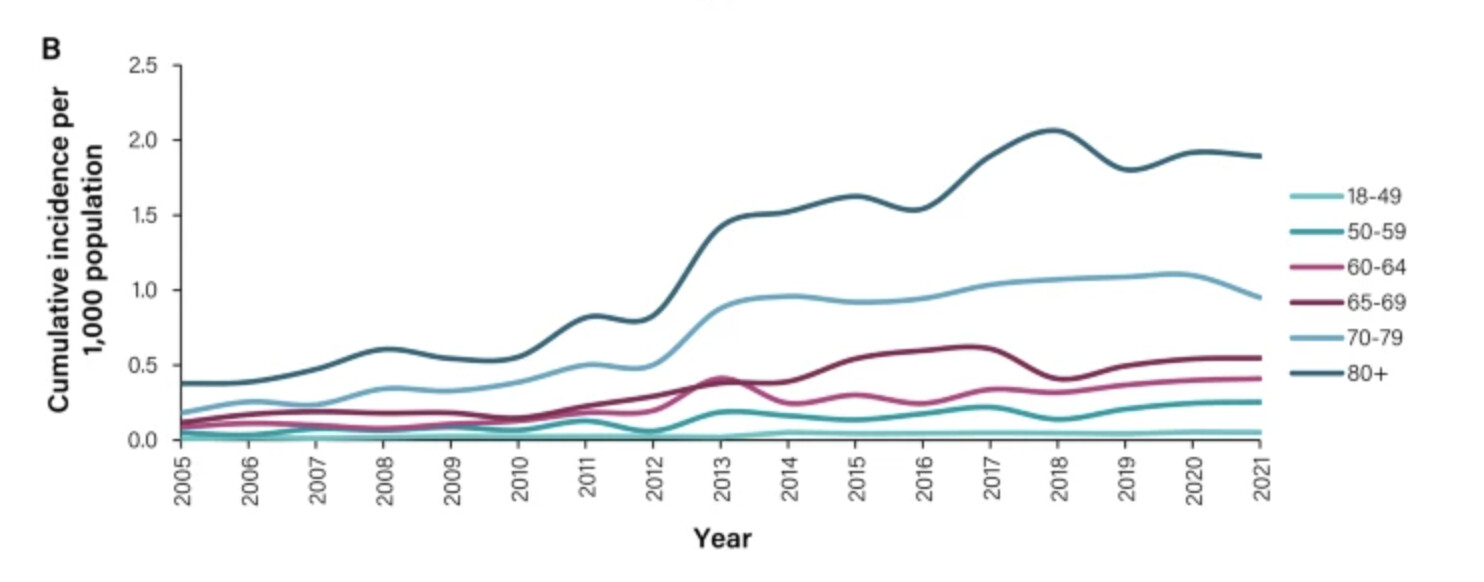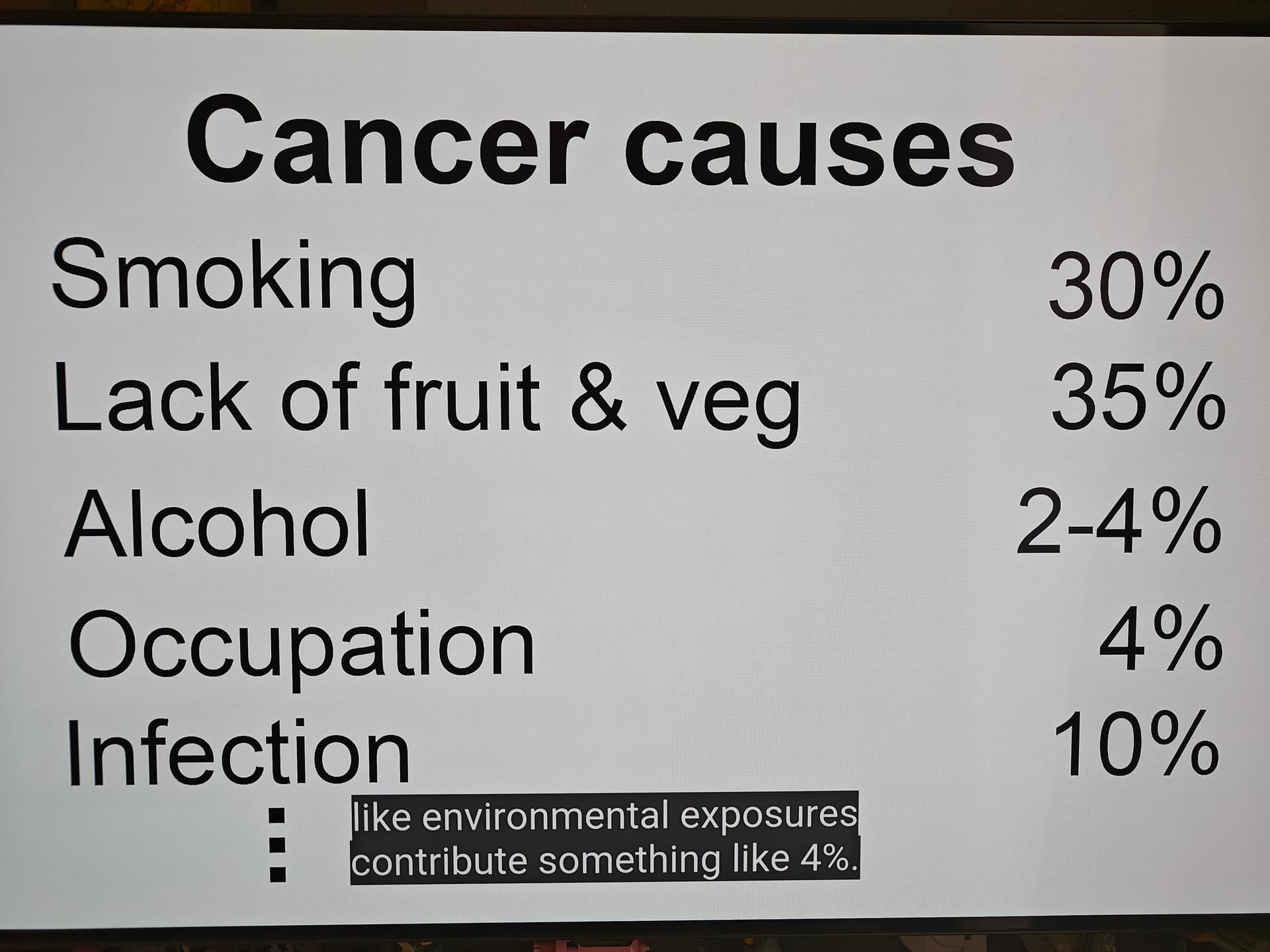Relevant: Live Zoster vaccination = 23% risk reduction in MACE
I get an RSV shot every year. 20 USD and shots given out at my workplace.
They don’t want us to get sick.
This chart simply does not show that. While the rates are going up for all age groups, they are still relatively low in the 40’s.
As to your surprise that it’s not as great magnitude of risk as your expectations…… I don’t really know what to say— if 400% greater risk seems low to you.
Let’s talk RSV vax.
I am about to be 59 and my doc doesn’t advise it for me.
I can’t remember if you are older than I am, but is this something we are all getting?
I’m got the flu shot. RSV should also be good.
Show what? There are two facts that these graphs show:
- Older people are more at risk.
- Young people now have a similar risk as people aged ~60yo in the 90s.
So if you say “Young people are not at risk” based on your knowledge of the 90s, you’re wrong.
This chart in Sweden (that only starts in 2005, I’d love to see before) shows a similar trend:
The massive difference between young and old people is that shingles is still way worse among old people in terms of long-term pain (PHN):
By the way, that’s why the age for recommended vaccination has been decreased all over the world over the past decades:
- UK: 70+ in 2013 => 65+ in 2023 => 60+ in 2025 (progressively over the next few years)
- US: 60+ in 2006 => 50+ in 2011
- Canada: 60+ in 2008 => 50+ in 2018
- Israel: 60+ before => 50+ in 2023
Of course, the government cares about cost. They only make a decision if it is cost-effective for them in the short-term. Shingrix is approved from age 50 but there are ongoing trials looking at the efficacy on younger healthy people:
- NCT06932523 from age 40
- NCT06874842 from age 40
- NCT06801509 from age 40
- NCT05856084 from age 30
- NCT05636436 from age 18
Given the increase in incidence in younger people, the good results showing long-term efficacy, and the ongoing trials, it’s pretty sure that in a few years the shingles vaccine will be recommended from an even younger age all around the world (40yo?).
My parents seem to think I had a very mild case of chickenpox when I was young, though my recent Varicella Zoster IgG test came back negative, indicating no prior infection. Based on the information in this thread would it be wise to get both a chickenpox and shingles vaccine? Or is the shingles vaccine unnecessary?
Each person may have their own way of thinking of things. But if I were you, I’d first get the course of chickenpox vaccine, and then after 6 months or so, get the shingles course (shingrix).
The mix-and-match of different vaccines should result in a more robust immunity.
RSV vaccines have now shown to reduce risk of dementia, like the shingrix.
Both are AS01-adjuvenated.
https://www.nature.com/articles/s41541-025-01172-3
This is really interesting. Some part of the positive effect of these vaccines of dementia might be from preventing infections and resulting inflammation, but some part is from the adjuvant itself. This paper focuses on the impact of the adjuvant system itself. The question is: whereas for infection (recurrence) prevention earlier immunization would be better, for the benefit of the adjuvant system would earlier (e.g. age 40) be better, or is waiting until 50 or even 60 necessary for the benefit to appear? It depends on the mechanism of action, but it would be good to know.
A lot of vaccines let you get them early if you have certain conditions. Such as asthma, or one i read, a sedentary lifestyle. I have asthma and went this route before and I dont think they even had a way to check.
RSV vaccines indication has been expanded to the below 60 years of age for some people.
RSV vaccine access expanded to some people in their 50s, according to CDC website
What are your thoughts on getting Smallpox vaccination? (The Monkeypox vaccine also gives you Smallpox).
It’s free for me in NZ (if I tell them I’m sexually promiscuous).
My thinking is - it provides protection against a Blackswan-type event… if Smallpox ever got back out in the wild (lab leak, bio terror, war etc), then any vaccine stockpiles would disappear very quickly. Smallpox has long incubation period, high R, so would spread like wildfire and a death rate of ~30%…
Wondering if I am missing anything?
I think it’s a good idea as it would give you protection from a black swan event, as you mentioned. I don’t see the downside here.
Arizona resident dies from the plague less than 24 hours after showing symptoms
A person has died from the plague in Northern Arizona, health officials confirmed Thursday.
The victim was rushed to Flagstaff Medical Center, showing severe symptoms, and died the same day. An autopsy revealed Yersinia pestis, the bacterium responsible for plague, was found. No further details about the patient or their identity have been revealed.
This case comes amid a recent prairie dog die-off northeast of Flagstaff, a classic red flag for plague activity since these rodents often carry infected fleas.
Coconino County officials are investigating an unknown number of prairie dog deaths linked to plague. They are working with a property owner to collect fleas for testing.
The plague remains rare in modern America, with the Centers for Disease Control reporting an average of seven human cases annually, the majority of which occur in rural areas of the Western U.S., including northern Arizona and parts of New Mexico and Colorado.
There’s a Plague Vaccine?
This graphic shows how vaccines may prevent cancer as 10% of cancer is caused by infection.
Source found at 14:00 from the below video.
There are quite a few people arguing a reasonable case that much cancer starts with mitochondrial failure.


